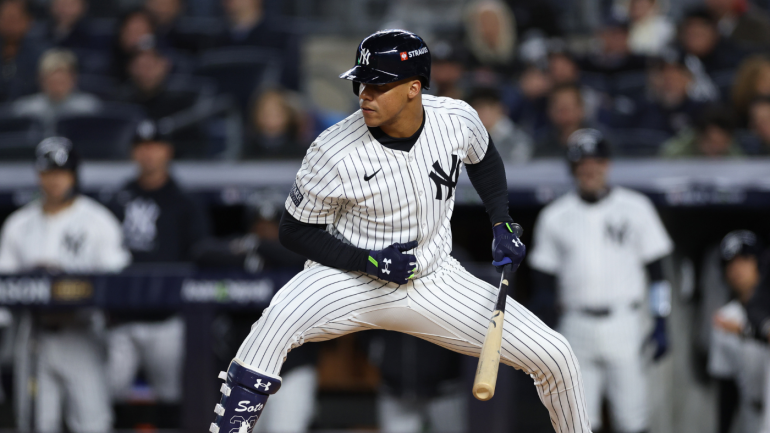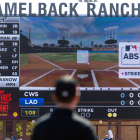
Major League Baseball's winter meetings are just over three weeks away, and they can't come soon enough if you're a fan of transactions.
With the exception of the busy Los Angeles Angels (who added another veteran to their bounty on Thursday), the first act of the offseason has provided notable moves on a few and far between basis. Every top 50 free agent remains unsigned, and the next trade that inspires a social media manager to post the eyes emoji will be the winter's first.
Just what's to blame for the cold hot stove? Below, we've identified three contributing factors that should -- in due time -- resolve themselves and allow the offseason to shift into the next gear.
1. The Soto waiting game
You might recall that last offseason dragged until Shohei Ohtani made his choice. The same effect is in play this year, but with outfielder Juan Soto instead. Soto and agent Scott Boras are taking meetings with various teams' brain trusts to determine which club is the best possible fit. (Spoiler: it'll be the one that offers the most money.)
Given the kind of green being tossed around in Soto bidding, it stands to reason that teams are going to have to wait until learning where they stand before they attend to their Plan B or Plan C options. After all, Soto himself will likely cost as much on a yearly basis as a few mid-tier free agents combined.
Realistically, we're talking about a handful of teams who are serious contenders to land Soto. What excuse does the rest of the league have? We're glad you asked.
2. ...and Sasaki, too
Whereas Soto's expected price tag limits his market to a few realistic suitors, right-hander Roki Sasaki is for the masses. Sasaki, not yet officially posted by Japan's Chiba Lotte Marines, is classified by MLB as an amateur free agent because of his youth and professional service time. That, in turn, means that he's only allowed to sign for as much money as a team can offer him out of their international bonus pool.
Sasaki is an exciting talent, an explosive right-hander whose original claim to fame was recording a 19-strikeout perfect game back in 2022. Players of this caliber are seldom made available ahead of their age-23 season. Factor in how there's a hard cap on his terms, and it only stands to reason that every team is going to attempt to woo him -- similar to how Shohei Ohtani's initial free agency played out.
That kind of demand naturally leads to a prolonged bidding process, with teams keeping their powder dry until they learn where they stand in the race. Sasaki's free agency has a chance to play out in slow motion, since it would behoove both him and the Marines (who will receive a fee in accordance to how much he signs for) to wait until the new international free-agent period opens on Jan. 15 before finalizing a deal -- for reference, only two teams are believed to have more than $2 million to offer this cycle, with those being the Los Angeles Dodgers and the Baltimore Orioles. Once the calendar flips, pools are refreshed, with several teams boasting more than $7.5 million in available funds.
3. Where are the sellers?
With all the focus on Soto and Sasaki, it's easy to overlook that the trade market has been slow to accelerate. One plausible reason for that? A shortage of sellers.
Of the 18 teams who missed the postseason, there are only a few teams likely to sell off veterans: the Miami Marlins, Chicago White Sox, Colorado Rockies, and Athletics. (And some of those clubs spent the summer moving veteran pieces, winnowing their capacity.) Otherwise? The Angels are clearly trying to improve; the Nationals, Pirates, and Reds no doubt see themselves as teams on the rise; and so on.
Whenever there's a lack of sellers, there are a few possible paths the winter could take. Foremost, it's possible that the trade market remains chill all offseason. It's also possible that some fringe teams slide into selling to take advantage of the market (the Tampa Bay Rays did this at the deadline), or that clubs get more creative and try to hammer out some challenge trades with one another (easier said than done, to be sure).
How, precisely, things play out over the coming months is to be determined. Still, there's reason to believe it's only a matter of time before the stove heats up.

















